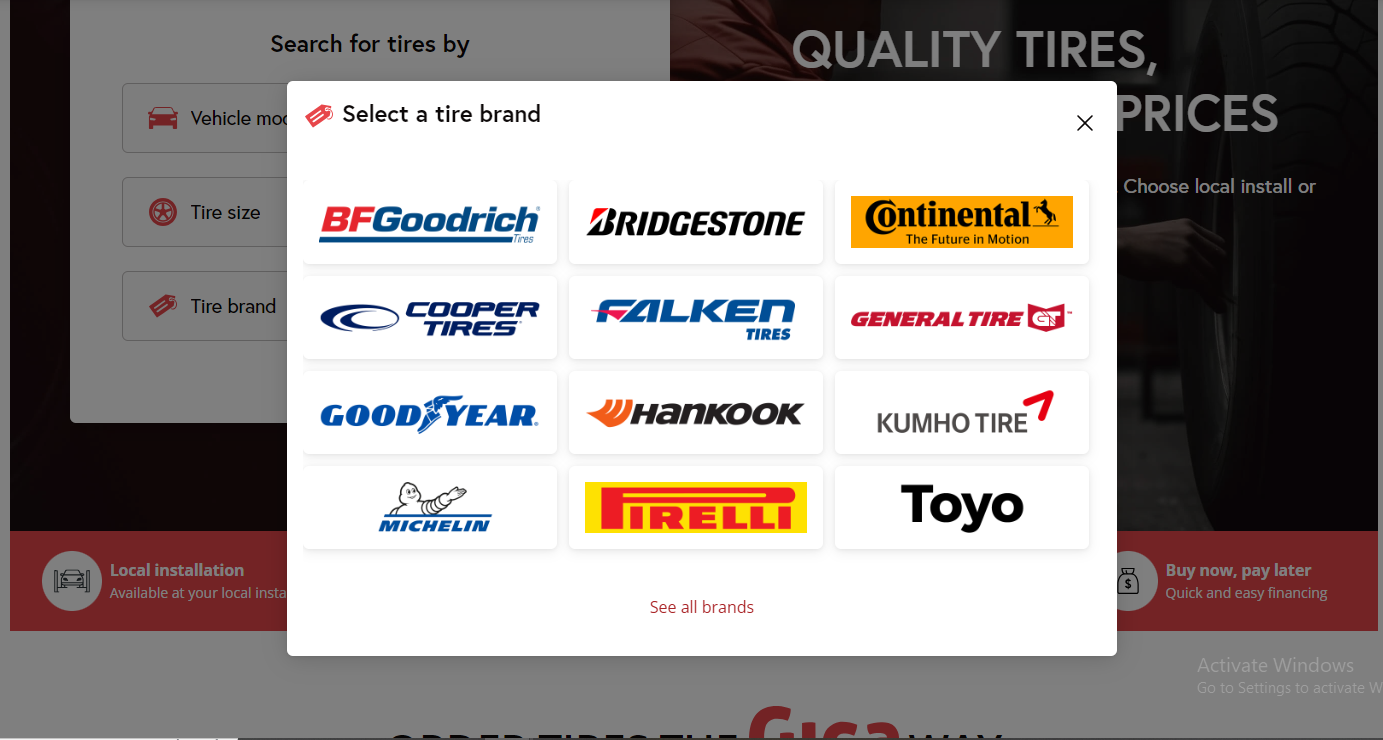Last Updated on 4 months
Unveiling the Best Tire Brands on the Market
This comprehensive analysis penetrates the tire industry, where the best tire brands will be revealed. Tires transcend mere vehicle components; they guarantee your safety, elevate your driving experience, and maximize your car’s performance. This car meticulously dissects the tire realm, scrutinizing various brands and their distinguishing characteristics. Our objective is to equip you with invaluable knowledge, empowering you to make an informed decision when selecting tires for your vehicle.
The Impact of Choosing the Right Tires
The significance of choosing the right tires for your vehicle cannot be overstated. Tires are the only point of contact between your car and the road, playing a pivotal role in safety, comfort, and performance. Here are some key aspects where the right tire choice makes a difference:
- Safety: The right tires can drastically improve your vehicle’s security. They ensure better grip and handling, especially in adverse weather conditions. Tires with excellent traction can reduce stopping distances and improve maneuverability, significantly lowering the risk of accidents.
- Performance: High-quality tires can enhance your vehicle’s performance. They improve handling, cornering, and acceleration, offering a more responsive driving experience. This is particularly crucial for performance vehicles, where precision is critical.
- Comfort: Tires also play a substantial role in the comfort of your driving experience. They can reduce road noise, absorb shocks from uneven surfaces, and provide a smoother ride. The correct tire can transform a bumpy journey into a pleasant cruise.
- Fuel Efficiency: Surprisingly, tires also impact fuel efficiency. Specific tire designs and materials can reduce rolling resistance, meaning your vehicle doesn’t have to work as it doesn’t saves fuel and reduces emissions. This is an essential consideration for environmentally conscious drivers.
- Longevity and Durability: Quality tires tend to last longer, offering more miles before they need replacement. This durability means better value for money in the long run and fewer frequent tire changes.
- Resale Value: Vehicles fitted with high-quality, well-maintained tires can have a higher resale value. It indicates to potential buyers that the vehicle has been well cared for.
- Adaptation to Specific Conditions: Different tires are suited for different conditions. All–season, summer, and winter tires each have unique features designed for specific climatic conditions. You choose the right tire according to your region’s weather patterns for optimal performance.
- Legal Compliance: In some regions, there are legal requirements regarding tire specifications, such as tread depth. Ensuring that your tires meet these requirements is essential to avoid fines and ensure roadworthiness.
The Evolution of Tire Brands
The history of tire brands is a fascinating journey of innovation and technological advancement. In this section, we explore the evolution of tire brands from their humble beginnings to the sophisticated products we see today.
A Journey Through Tire History
The story of tires begins in the 19th century. The earliest tires were simply bands of metal fitted around wooden wheels, used primarily on carts and wagons. With the advent of the pneumatic tire, patented by John Boyd Dunlop in 1888, the tire industry began to resemble what we know today. Initially designed for bicycles, Dunlop’s invention brought about a revolution in comfort and efficiency.
As the automotive industry grew, so did the tire industry. The early 20th century saw companies like Michelin, Goodyear, and Firestone emerge, all of which would become giants in the tire world. These companies innovated with materials and tread designs, making tires safer and more reliable.
The introduction of synthetic rubber during World War II was a significant milestone. This development was crucial, especially since natural rubber supplies were limited. Post-war, the tire industry saw rapid growth, with advancements in radial tire technology in the 1940s and 1950s vastly improving tire durability and performance.
How Modern Tire Brands Evolved
The evolution of modern tire brands is marked by continuous innovation in response to changing consumer needs and technological advancements. Today’s tire brands focus on the fundamental aspects of safety and performance and specific needs like fuel efficiency, environmental impact, and adaptability to different weather conditions.
- One significant trend in the evolution of modern tires is the shift towards eco-friendly production and materials. Leading tire manufacturers are investing in sustainable practices, from sourcing eco-friendly materials to reducing emissions during manufacturing.
- Another critical area of evolution is the integration of technology. Today’s tires are becoming’ stere,’ with features like sensors that monitor pressure and temperature, enhancing safety and performance. The development of airless tires is also on the horizon, promising to eliminate the risk of punctures.
- Moreover, tire brands have diversified their offerings to cater to various vehicles and driving conditions. The variety is vast, from high-performance tires for sports cars to durable all-terrain tires for SUVs. Winter and all-season tires have also seen significant advancements, offering better grip and handling in various weather conditions.
The evolution of tire brands reflects a history of ingenuity and adaptation. From Dunlop’s first pneumatic to today’s high-tech offer, brands have continually reinvented themselves to meet the demands of a changing world. As we move forward, we can expect this trend of innovation and evolution to continue, shaping the future of mobility and driving experiences.
Criteria for Evaluating Tire Brands
In the competitive world of automotive tires, discerning the quality and value of different brands can be challenging. His section of our comprehensive guide on Giga Tires focuses on the critical criteria for evaluating tire brands, namely quality and performance standards, and the significance of consumer ratings and industry awards.
Quality and Performance Standards
Quality and performance standards are crucial in assessing tire brands. These standards encompass various aspects:
- Durability and Tread Life: A tire’s lifespan, indicated by tread life, is a primary measure of quality. Durable tires offer long-term financial savings and ensure consistent performance over time.
- Safety Features: This includes the tire’s ability to maintain stability in different driving conditions, particularly in wet or slippery environments. Features like anti-hydroplaning designs are essential for safety.
- Handling and Responsiveness: A high-quality tire should provide excellent handling capabilities, ensuring the vehicle responds accurately to steering inputs, especially at high speeds or corners.
- Comfort and Noise Level: The tire’s design can significantly affect ride comfort and noise level. Advanced tire technologies aim to reduce road noise and absorb vibrations, enhancing the driving experience.
- Fuel Efficiency: Tires with low rolling resistance can improve fuel efficiency. His feature is increasingly essential in environmental sustainability and cost savings.
- Load and Speed Ratings: These ratings are critical for safety and performance, especially for vehicles that carry heavy loads or travel at high speeds.
- All-Weather Performance: For many drivers, tires that perform reliably in various weather conditions, including wet, dry, and snowy environments, are essential.
- Innovations and Technological Advancements: Continuous research and development in tire technology, such as reinforced sidewalls or advanced rubber compounds, set apart top-tier tire brands.
Consumer Ratings and Industry Awards
Consumer ratings and industry awards are invaluable for evaluating tire brands, providing insights from both users and experts:
- Consumer Reviews and Testimonials: Customer feedback offers real-world information about tire performance, durability, and overall satisfaction. Websites, forums, and social media platforms are rich sources of such user experiences.
- Independent Tire Tests: Organizations and automotive publications conduct comprehensive tire tests, evaluating various brands under controlled conditions. These tests provide unbiased comparisons of performance, safety, and durability.
- Industry Awards: Awards from reputable automotive organizations or magazines are significant endorsements. They recognize excellence in innovation, performance, and consumer value.
- Ratings from Safety and Environmental Regulatory Bodies: Compliance with safety standards set by the government and international bodies is a testament to nature’s quality. Environmental certifications highlight the brand’s commitment to sustainability.
- Brand Reputation and Legacy: Long-standing brands often have a track record of reliability and quality history in the industry, indicating their commitment to maintaining high standards.
Leading Tire Brands of the Year
In the dynamic world of automotive tires, certain brands have distinguished themselves through exceptional performance, innovation, and dedication to quality. This section of our comprehensive guide on Giga Tires focuses on the leading tire brands of the year, each renowned for specific strengths that set them apart in the industry.
Cooper Tire: Synonymous with Reliability
Cooper Tire has built a reliable reputation for consistently delivering quality and value. Ey aspects of their success include:

- Diverse Product Range: Offering various tires suitable for vehicles and driving conditions.
- Affordability and Value: Known for providing quality tires at competitive prices, Cooper Tire balances cost-effectiveness and performance.
- American Heritage: With a rich history in the American tire industry, they deeply understand customer needs and preferences in the U.S. market.
- Innovative Thread Designs: CooperTire’s tread patterns are designed for longevity and improved handling, contributing to their reliability.
Firestone Tire: Innovators in Tire Technology
Firestone Tire is a pioneer in tire technology, with several innovations to its credit. Their notable achievements include:

- Performance Tires: Specializing in high-performance tires with superior handling and speed capabilities.
- Run-Flat Technology: Firestone has been a leader in developing run-flat tires, offering enhanced safety and convenience.
- Racing Pedigree: With a history in motorsports, Firestone brings high-performance standards from the track to consumer tires.
- Advanced Rubber Compounds: Utilizing cutting-edge materials to enhance tire durability and performance.
Continental AG: Setting Standards in Safety
Continental AG is globally recognized for setting high standards in tire safety. Their commitment to safety is evident through the following:

- Innovative Safety Features: Introducing technologies such as ContiSense and ContiAdapt enhances tire safety and adaptability.
- Exceptional Wet Grip: Continental tires are known for their excellent performance in wet conditions, reducing the risk of aquaplaning.
- Premium Quality: Consistently delivering high-quality tires that meet stringent safety standards.
- Active Safety Research: Investing heavily in research and development to continually improve tire safety.
BFGoodrich: Masters of Off-Road Tires
BFGoodrich has carved a niche as the master of off-road tires thanks to its:

- Rugged Tread Patterns: Designed for maximum traction on all off-road surfaces.
- Durability: Constructing tires that withstand the most challenging off-road conditions, from rocky terrains to muddy trails.
- Off-Road Racing Heritage: Leveraging experience from off-road racing to design tires that meet the demands of extreme environments.
- Innovative Technologies: For example, the Krawl-TEK compound enhances grip on rock and slick surfaces.
Michelin: Pioneers in Eco-Friendly Tires
Michelin leads the way in eco-friendly tire manufacturing with its commitment to sustainability. His efforts include:

- Green X Technology: Focusing on reducing rolling resistance for improved fuel efficiency and reduced CO2 emissions.
- Long-Lasting Tires: Michelin’s tires have extended life, reducing the environmental impact of frequent tire replacements.
- Sustainable Materials: Utilizing environmentally friendly materials and processes in tire production.
- Global Sustainability Initiatives: Michelin is involved in various international projects promoting sustainable mobility.
These leading tire brands exemplify the best in the tire industry, each contributing uniquely to reliability, technology, safety, off-road capability, and environmental responsibility. Understanding their strengths and specializations helps consumers make informed choices suited to their needs.
Comparative Analysis of Top Tire Brands
In the realm of automotive tires, the differentiation between top brands often boils down to nuanced details in performance, endurance, traction, fuel efficiency, sustainability, and customer support. His section on our comprehensive guide on Giga Tires offers a detailed comparative analysis of top tire brands across these crucial parameters.
Performance and Endurance Tests
Performance and endurance are primary benchmarks for evaluating tire brands. These tests assess how tires behave under various driving conditions and how long they last before showing signs of wear. Ey aspects I include:
- Tread Wear Ratings: This is a standardized measure indicating the expected lifespan of the tire tread. Rands with higher ratings generally offer longer-lasting tires.
- Handling and Responsiveness: Tests include assessing tires on wet and dry surfaces, evaluating how well they maintain grip, and responding to steering inputs.
- Speed and Load Ratings: These ratings provide insights into the maximum speed and weight the tires can handle, which is crucial for performance and safety.
Traction and Stability in Extreme Conditions
Traction and stability are critical for safety, especially in extreme conditions like heavy rain, snow, or off-road environments. Comparative analysis in this area involves:
- Wet and Snow Traction: Assessing how well tires perform on wet roads and in snowy conditions is vital in preventing accidents.
- Off-Road Capabilities: For all-terrain and off-road tires, the focus is on how effectively they can handle mud, gravel, and rocky terrains.
- Heat Dissipation: In high-speed or heavy-load scenarios, a tire’s ability to dissipate heat prevents blowouts and maintains structural integrity.
Innovations in Fuel Efficiency and Sustainability
With growing environmental consciousness, fuel efficiency, and sustainable practices in tire manufacturing have become increasingly important. A comparison includes:
- Rolling Resistance: Tires with low rolling resistance reduce the energy needed for a car to move, thereby improving fuel efficiency.
- Use of Eco-friendly Materials: Some brands have pioneered the use of sustainable materials in tire production, reducing environmental impact.
- Recycling and Retreading Programs: Brands that offer tire recycling or retreading services demonstrate a commitment to sustainability.
Warranty and Customer Support Services
Warranty terms and customer support indicate the brand’s confidence in the products and commitment to customer satisfaction. The comparative analysis here focuses on the following:
- Warranty Duration and Coverage: Longer warranties or comprehensive coverage are signs of a brand’s trust in its brand’s quality.
- Customer Service Accessibility and Responsiveness: Brands with a reputation for easy-to-reach and helpful customer service provide added value.
- Road Hazard Coverage: Some brands offer additional protections, like road hazard coverage, which is a bonus for consumers.
This comparative analysis of top tire brands across performance, traction, sustainability, and customer support highlights the tire industry’s diverse range of specialization. By understanding these nuances, consumers can make informed choices and select tires that fit their needs and align with their values and expectations.
The Future of Tire Technology
The tire industry is pivotal, with emerging technologies and environmental considerations shaping the future. T is a section of our comprehensive guide on Giga Tires, which delves into innovative trends, the rise of eco-conscious production, and the anticipated innovations in tire technology.
Innovative Trends in Tire Manufacturing
Pursuing enhanced performance, safety, and sustainability drives innovation in tire manufacturing. Some of the key trends include:
- Airless Tires: Companies like Michelin and Bridgestone are pioneering the development of airless tires, which promise to eliminate the risk of punctures and reduce maintenance.
- Smart Tire Technologies: The integration of sensors within tires to monitor conditions like pressure and temperature is becoming more prevalent. This technology aims to improve safety and tire life.
- Advanced Materials: New materials, such as silica-infused rubber compounds, enhance grip and reduce wear. N technology is also being explored to create more durable and efficient tires.
- Customizable Treads: Technologies that allow tire treads to change according to weather conditions are being developed, providing optimal performance in varied environments.
The Rise of Eco-Conscious Tire Production
Eco-friendly initiatives are increasingly becoming a priority in tire manufacturing. Key developments in this area include:
- Sustainable Raw Materials: There is a shift towards using more sustainable materials like bio-based rubbers and fillers.
- Reducing Carbon Footprint: Tire manufacturers are adopting practices to reduce energy consumption and greenhouse gas emissions during production.
- Recycling and Upcycling: Efforts to recycle old tires into new products or other valuable materials are rising, reducing waste and conserving resources.
- Low Rolling Resistance Tires: The development of tires that improve fuel efficiency and reduce emissions is a significant focus area, aligning with the global push towards reducing environmental impact.
Anticipating the Next Wave of Tire Innovations
Looking ahead, the tire industry is poised for transformative changes. Se anticipated innovations include:
- Electrification and Autonomous Vehicles: As electric and autonomous vehicles become more common, tire designs will adapt to meet their specific needs, such as accommodating heavier loads and different usage patterns.
- Biodegradable Tires: Research into fully biodegradable tires could revolutionize the industry, making tire disposal more environmentally friendly.
- Tires with Built-in Wear Indicators: Innovations that make it easier for drivers to understand tire wear and when to replace them are expected to become standard.
- Increased Customization: Advancements in manufacturing technologies may allow for more customized tire options tailored to individual driving styles and preferences.
The future of tire technology is promising, with advancements aimed at enhancing performance, safety, and sustainability. These innovations signify a leap in technical capabilities and reflect a growing commitment to environmental responsibility within the industry. As new technologies emerge and consumer expectations evolve, the tire industry is set to undergo significant transformations.
Selecting the Perfect Tire for Your Vehicle
Choosing the right tire is a critical decision for any vehicle owner. It affects not only the performance and safety of your vehicle but also your overall driving experience. In this section of our comprehensive guide on Giga Tires, we’ll explore how to select the perfect tire for your vehicle, focusing on understanding tire specifications, aligning your choice with your driving habits, and balancing cost with quality.
Deciphering Tire Specifications and Features
Understanding tire specifications is crucial in selecting a tire that fits your vehicle’s needs. Here are the vehicle specifications to consider:
- Size: This is found on the tire’s sidewall, presented by a series of numbers and letters indicating the tire’s width and aspect ratio of the tire’s diameter.
- Load Index and Speed Rating: The load index indicates how much weight the tire can support, while the speed rating signifies the maximum speed the tire can handle safely.
- Tread Type: The tread type varies depending on driving conditions – all-season, winter, or summer treads.
- Tire Type: Options include standard, run-flat, or all-terrain tires, each offering different benefits and suited to other situations.
- UTQG Rating: The Uniform Tire Quality Grading (UTQG) rating system assesses the tire treadwear and traction, the tire’s temperature resistance.
Tailoring Your Choice to Your Driving Habits
Your driving habits play a significant role in determining the right tire for your vehicle:
- Driving Environment: Consider the typical roads you drive on – city streets, highways, or off-road trails.
- Weather Conditions: Choose tires that perform well in our area, which is predominantly sunny, rainy, or snowy.
- Driving Style: If you prefer a quiet, comfortable ride, look for tires designed for comfort. If you enjoy spirited driving, performance tires might be more suitable.
- Vehicle Type and Use: Ensure the tires you select suit your vehicle type and the load it typically carries.
Balancing Cost and Quality in Tire Selection
While cost is an essential factor, it shouldn’t be the so Ledet shouldn’t in your tire selection:
- Invest in Quality: Quality tires might have a higher upfront cost but can offer better performance, safety, and longevity, providing better value in the long run.
- Consider Long-Term Savings: Tires with longer tread life or those that improve fuel efficiency can save money over time. Don’t Compromise on Safety. It’s crucial not to compromise safety for cost—Look for tires with the best combination of safety features within your budget.
- Warranty and After-Sales Service: Consider the promise and the tire manufacturer’s level of manufacturing.
Conclusion & Recommendations
As we conclude our comprehensive guide on tire selection and evaluation, let’s recap the critical information and provide some final recommendations to aid tire buyers in making the best decision for their needs. T is a guide brought to you by Giga Tires, which aims to simplify choosing the right tire and ensure you are equipped with all the necessary information.
Summary of Top Tire Brands and Their Key Features
Through our exploration, we’ve identified several brands, each with unique strengths. The bra is like Cooper Tire, and Michelin has been highlighted for reliability and eco-friendliness. Fi estone Tire stands out for its innovations in tire technology, while Continental AG sets the standard for safety. BF Oodrich has been recognized for its exceptional off-road tires. Each brand has specific features to meet different driving needs and conditions: durability, performance, safety, and environmental sustainability.
Guidance and Tips for Tire Buyers
When selecting tires, it is essential to consider tire size, load index, speed rating, and tread type, all of which should align with your vehicle’s requirements and habits. The correct tire can significantly enhance your vehicle’s performance and stability on the road. Balanced cost and quality are crucial; investing in a quality tire can lead to long-term savings and improved driving experience. Always prioritize security, and feel free to consult professionals if you need clarification on the best tire for your vehicle.
As you select the perfect tire, remember that the right choice can transform your driving experience. It’s not just about the tire; it’s about the journey it enables and the peace of mind it brings.
Giga Tires is here to help you make that choice. With our extensive range of top-quality tires from renowned brands, finding the right tire has always been challenging. Our user-friendly website, detailed product descriptions, and customer reviews provide you with all the information you need at your fingertips.
We invite you to explore our selection at Giga Tires. Discover the perfect tires for your vehicle and enjoy a seamless shopping experience. Our commitment to quality, customer service, and competitive pricing makes us the ideal choice for your tire needs.
Your journey to a better driving experience starts here. Tr St Giga Tires provides tires that will take you safely and efficiently wherever you need them.
FAQs
What is the most popular tire brand in the world?
Michelin is often cited as one of the most popular tire brands globally. Renowned for its quality, durability, and innovation, Michelin has established a strong presence in various markets worldwide.
Which brand of tire is best?
The”best” tire brand depends on specific needs and preferences. Brands like Michelin, Bridgestone, and Continental are generally highly regarded for their quality and range of options.
What is the best brand of all-season tires?
Goodyear is frequently recommended for all-sea tires. Their products offer a good balance of wet and dry traction, durability, and comfort for various driving conditions.
What tires offer the best ride?
Pirelli tires are often praised for offering the best ride, especially in terms of comfort and noise reduction, making them a top choice for luxury and performance vehicles.
How do tire brands differ in terms of performance and safety?
Tire brands differ significantly in their focus areas. Some prioritize high-performance handling and speed, while others focus on safety features like wet grip and braking efficiency. It’s essential to choose a brand that aligns with your primary concerns.
What should I consider when choosing tires for off-road driving?
Look for tires with robust construction, deep treads, and strong sidewalls for off-road driving. Brands like BFGoodrich and Cooper are known for their excellent off-road tire options.
Are there eco-friendly tire options available?
Brands like Michelin and Continental offer eco-friendly tires made from sustainable materials. These tires are designed to improve fuel efficiency through low rolling resistance.
How often should I replace my tires, and what are the signs of wear?
Depending on usage, tires should generally be replaced every 6 to 10 years. Signs of wear include visibly worn treads, cracks or bulges in the sidewall, and increased vibration or noise while driving.










